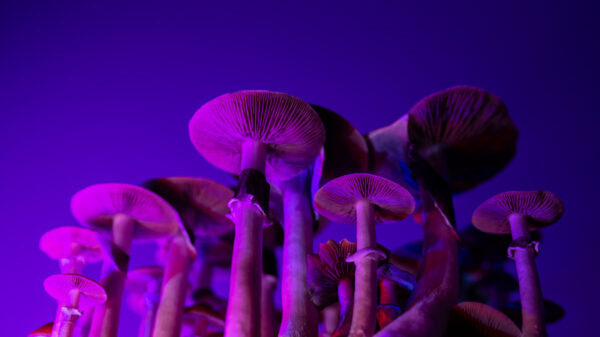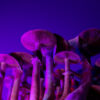Unlike most videogames, which invite you to become something else, SoundSelf invites you to unbecome.
Instead of rescuing a pink princess as a portly Italian plumber or cartoonishly murdering strangers as a impromptu carpenter, this new breed of game is designed to dismantle the illusion of identity altogether.
Through an audio feedback loop of your own voice and an immersive visual environment, SoundSelf — which had its official release April 22 on Steam — aims to induce a trance-like state that slips your consciousness into a state apart from your accustomed mind-body relationship.
As a wave of renewed interest in psychedelics sweeps through the medical and venture capital communities, advancements in tech-based analogues are also spreading through the collective e-conscious. And if similar perception-expanding, often therapeutic experiences can be facilitated without the associated gut rot or potential bad trip, industry onlookers should be paying close attention.
For anyone reading this whose distinction between inner and outer reality has been blurred or perhaps annihilated for a period of time, that experience has likely been the result of ingesting a psychedelic compound — psilocybin, lysergic acid diethylamide, mescaline etc.

SoundSelf designer and Andromeda Entertainment CEO Robin Arnott. Submitted photo
To designer and Andromeda Entertainment CEO Robin Arnott, when you play his game, your cognitive apparati are ingesting another type of substance: a technodelic. And he means the term literally.
“It’s a digitally administered psychedelic, as opposed to an orally administered psychedelic,” he says.
Read more: Psychedelics are experiencing a renaissance, but don’t expect them to be legalized anytime soon
But while Arnott says SoundSelf is the first application to truly meet the definition of the word, it’s not a term he coined himself. Up until recently, it’s only existed as an imagined technology of the future.
In the ‘90s, pioneering psychonaut Terence McKenna said that the computers of the future will be drugs, and the drugs of the future will be computers.
“He was really spot-on,” Arnott says. “We’re just starting to see that both in terms of mind-altering experiences like SoundSelf but also we’re seeing the birth of digiceuticals, digital experiences that are designed to have a pharmaceutical impact on the body.”
He points to the U.S. Food and Drug Administration’s first clearance of a therapeutic videogame. Last month, the federal regulator permitted marketing of EndeavorRx, a prescription-only game device used to improve symptoms in children with attention deficit hyperactivity disorder (ADHD).
SoundSelf is for psychonauts
The intended audience for SoundSelf, Arnott says, is people interested in the inner workings of their reality — in other words, psychonauts. The continued rise of internal expeditioners is directly connected with the increase in demand for tools like psychedelics, which are becoming increasingly mainstream as means for exploration.
Arnott thinks these could be avid psychonauts trying other avenues as well, or just people who want something more accessible.
Even ten years ago, meditation was a pretty niche practice. It was associated with Buddhism, Eastern religion, and specific spiritual acts. Now meditation is practiced widely and is regularly applied by Western medicine. Arnott says the same thing is happening with psychedelics and people becoming more and more involved in exploring those inner vistas.

A study conducted by SoundSelf developer Andromeda Entertainment compared experienced states of consciousness between psilocybin, guided meditation (control) and SoundSelf (active). Chart via Andromeda
“And SoundSelf can absolutely do for a person what some aspects of psychedelics can do,” he said. “We did a pilot study and found people experiencing unitative states of consciousness with similar or increased regularity than with a full-blown psilocybin trip.”
Data from the study show brain states and qualitative experiences of altered states consistent with magic mushrooms.
Read more: First official call to decriminalize psychedelics in Canada to be heard later this year
It probably won’t surprise you that Arnott’s eight-year SoundSelf development journey started with a trip. The lauded sound designer for games like Antichamber and The Stanley Parable said a relatively subtle psychedelic experience led to his first oneness experience and left him with a roadmap of how he could use his discipline to design the game.
“It was like a download,” he says. “I just had this really intuitive sense that if I create a feedback loop around the voice and have an entire world responding subtly to your voice, it’s going to draw you into a trance where you naturally forget yourself.”
Conversely, Arnott’s first foray into game design made people forget themselves in a different way: by terrifying them. Forced to wear a sensory-depriving gas mask and asked by a voice to locate invisible enemies, Deep Sea has been called “the scariest game ever.”
“It was designed to scare the shit out of people and was very successful in doing that. It seems very different than SoundSelf, but in a way it was the foundation because that really began my interest in breath, psychology and totally taking somebody to a totally different world,” he says. “It turns out using terror as a tool to do that is a lot easier than getting a person to let go of their reality and fall into a bliss state.”
That was always the goal with SoundSelf — which was first introduced to the public in a successful Kickstarter campaign — to use the game design to invite a person into a repetitive action that would coax them into letting go of their illusion, letting go of their identity and just being in the stillness.
Will you blend?
So now you’re probably wondering: What is the experience of playing the game like, and does it actually work?
It starts with your voice. You’re instructed at the beginning of the experience to take deep inhales, and use your full exhalation to make a sound — an ohm or an ahh sound — a long tone. What this does, according to Arnott, is stimulate your parasympathetic nervous system via yogic breathing and the vibration of your voice.
“That tells your body you’re safe and this is a space where you can surrender,” he says. “As you’re toning the whole world is responding to you: The visuals are responding to your voice and breath, and the music is directly harmonizing with you, so there’s a real feeling of intimacy between the player — who is in a relaxed state already — and the whole sensory experience that the software’s producing.”
https://www.youtube.com/watch?v=9A1U6jSsGcw&feature=emb_title
After a certain amount of time, Arnott says the effect is your whole sense of self begins relaxing and washing out of your identification with the mind and body, and into everything you’re seeing, hearing and feeling.
“One of the very first steps to having real stillness is letting go of the restrictive identification of the body-mind,” he says. “Once that happens it’s very personal from there, but it tends to enter a place that is ineffable.”
To answer the question if SoundSelf can really produce these profound states of unified consciousness, I think the answer is yes, but not for everyone.
As someone who has failed to successfully meditate in the conventional sense after repeated, earnest attempts over the years, my own experience with SoundSelf was enjoyable but not profound. I found the toning practice relaxing and the sonic feedback engaging. However, after a few minutes of trying to let myself be taken by the game, I switched gears to playing with the audio loop. While I got a good cosmic chuckle, I doubt my ascetic tones of “weeeeeeeeeeeeeeeeeeed” or my Gregorian chant rendition of Careless Whisper fall in line with the developer’s intention.
On the other hand, the game has garnered multiple rave reviews from meditators, meditation teachers and even people who have struggled with the practice. SoundSelf also got a notable nod from comedian and podcaster Duncan Trussell, whose new Netflix series The Midnight Gospel’s combination of surreal animation and heady conversation produces a psychedelic intensity in its own right.
Aware of my own lack of suggestibility and the game’s use of meditation to begin and end a session, I asked Arnott if he thinks the game is best suited for people who practice meditation.
“A person who’s more versed in meditation has more potential to take the software and go deeper with it — I think the same is true of psychedelics,” he replied. “But a person with no experience with those disciplines can absolutely have a breakthrough experience, and I’ve seen that happen many times. The nature of that breakthrough can be more dramatic even if it doesn’t go as deep.”
And just like psychedelics, Arnott says the experience of his game is enhanced with the addition of a little weed.
Technodelics set to expand
As games like SoundSelf and other titles that take aim at psychic stagnancy come to market, they represent just the first movers in a new generation of games — technodelics that could be used by psychonauts, psychiatrists or experience-seeking individuals.
What’s been holding the movement back so far, in Arnott’s view, is partly the technology and partly the understanding of the nature of mind required to design them.
“As plant medicines are proliferating in Western culture, more people are going to have the requisite understanding of psychological reality in order to design experiences that impact a person’s psychology in as fundamental a way as SoundSelf can,” he says.
“As more and more people are exposed and become more adept at these sorts of explorations we’re really going to see the potential of technodelics expand quite a bit over the next decade.”
Top image: SoundSelf in-game screenshot via Andromeda
nick@mugglehead.com
@nick_laba














